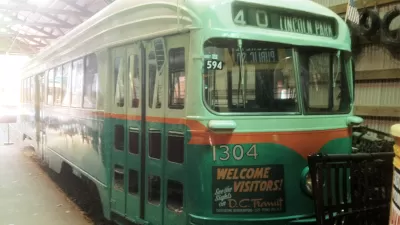Yes, this is the real deal. After years of delay and planning and construction mishaps, the long-awaited $200 million, 2.2 mile line streetcar line down H Street began service Saturday. Not all media were kind to the streetcar, even on opening day.
Adam Tuss, transportation reporter for NBC Washington, reports from H Street on the opening ceremony of the long-awaited, $200 million streetcar line.
Mayor Muriel Bowser kicked things off at 10 a.m. with a ceremony at 13th and H streets NE. Regular service began after the speeches
Tuss took a test drive on Friday—but he warns riders to expect delays due to congestion and collisions by motor vehicles, even if not with the streetcar.
"Car crashes needed to be cleared from the path twice during a test ride News4's Adam Tuss took Friday," notes the NBC report.
Initially the streetcar service will be free, but don't expect to catch the streetcar on Sundays—no service, according to Washington Post's FAQ. Expect "average speeds (of) 10 to 15 mph, according to the streetcar’s operations manager," writes Dr. Gridlock. Information is also available on the DC Streetcar website.
The Economist didn't join in the celebratory mood. Their Gulliver Business travel blog piece describes the "catastrophic execution" of the streetcar project. No surprise considering the magazine's 2014 piece on the streetcar titled "Rolling Blunder." Planetizen also chronicled the troubled history of the project, but not today.
Free rides for the first six months. "DDOT will announce the permanent fare policy at the end of the free service period," notes their webpage.
FULL STORY: All Aboard! DC Streetcar Service Starts Saturday

Maui's Vacation Rental Debate Turns Ugly
Verbal attacks, misinformation campaigns and fistfights plague a high-stakes debate to convert thousands of vacation rentals into long-term housing.

Planetizen Federal Action Tracker
A weekly monitor of how Trump’s orders and actions are impacting planners and planning in America.

Chicago’s Ghost Rails
Just beneath the surface of the modern city lie the remnants of its expansive early 20th-century streetcar system.

Bend, Oregon Zoning Reforms Prioritize Small-Scale Housing
The city altered its zoning code to allow multi-family housing and eliminated parking mandates citywide.

Amtrak Cutting Jobs, Funding to High-Speed Rail
The agency plans to cut 10 percent of its workforce and has confirmed it will not fund new high-speed rail projects.

LA Denies Basic Services to Unhoused Residents
The city has repeatedly failed to respond to requests for trash pickup at encampment sites, and eliminated a program that provided mobile showers and toilets.
Urban Design for Planners 1: Software Tools
This six-course series explores essential urban design concepts using open source software and equips planners with the tools they need to participate fully in the urban design process.
Planning for Universal Design
Learn the tools for implementing Universal Design in planning regulations.
planning NEXT
Appalachian Highlands Housing Partners
Mpact (founded as Rail~Volution)
City of Camden Redevelopment Agency
City of Astoria
City of Portland
City of Laramie




























